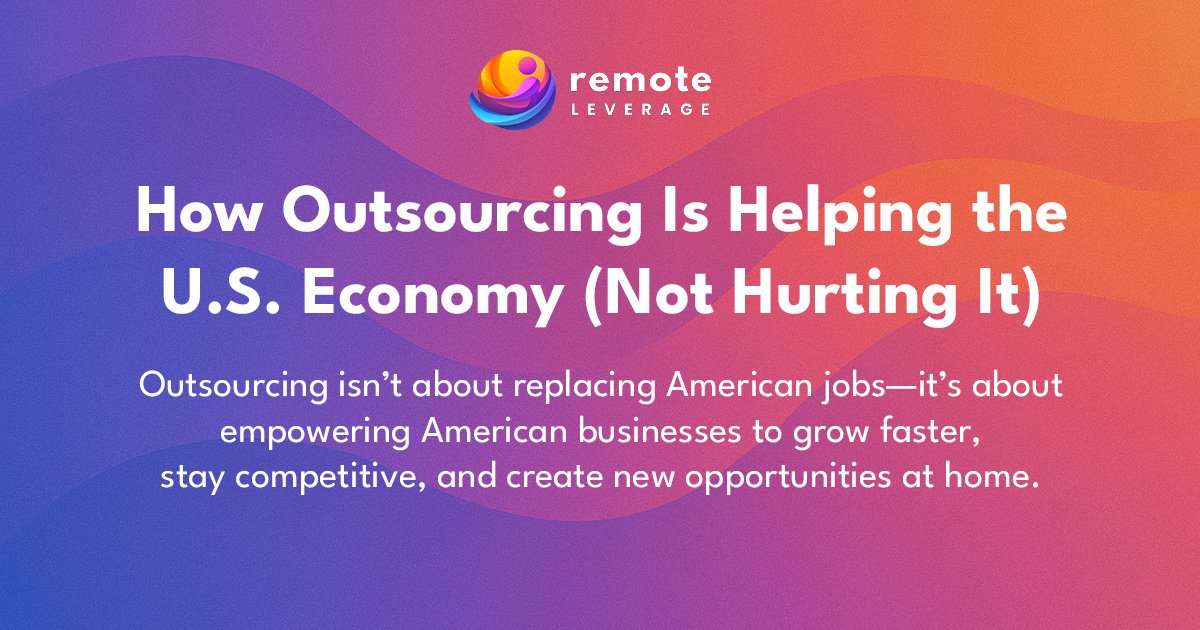
Let’s talk about the elephant in the Zoom room:
Outsourcing.
It’s a term that often sparks anxiety, especially around job loss and overseas competition. But here’s the truth most people don’t hear:
Outsourcing isn’t about taking jobs away—it’s about giving U.S. businesses the tools to thrive.
For small businesses, startups, and growing companies, outsourcing is not a shortcut. It’s a lifeline. And in many ways, it’s helping the U.S. economy become stronger, more resilient, and more competitive.
Here’s why.
Q: Why do American businesses outsource in the first place?
A: Because it gives them access to skilled talent, cost savings, and flexibility they couldn’t get otherwise—especially in a tight labor market.
Outsourcing isn’t just for massive corporations.
Today, thousands of U.S. small businesses rely on virtual assistants, remote workers, and overseas specialists to help with:
This affordable support allows businesses to:
✅ Stay lean
✅ Operate efficiently
✅ Compete with larger players
✅ Scale faster without overextending
When businesses grow, they hire more people—at home and abroad.
Q: Does outsourcing really create U.S. jobs?
A: Yes. By freeing up capital and increasing output, outsourcing allows businesses to reinvest in domestic growth and hire more specialized local talent.
Here’s how it works:
When a small business hires a virtual assistant for admin work, they free up time and money. That saved capital might be used to:
In other words, outsourcing non-core tasks empowers U.S. teams to focus on high-value, high-wage work.
It’s not a zero-sum game. It’s a smarter allocation of resources.
Q: Isn’t outsourcing just about cutting costs?
A: It’s about staying competitive in a global economy—especially for smaller businesses that need to do more with less.
The global economy doesn’t wait for anyone. In today’s world:
If smaller businesses don’t embrace the same tools, they fall behind.
Outsourcing helps U.S. companies:
That’s how they survive tough times and thrive in the long run—which supports jobs, innovation, and tax revenue here in the U.S.
Q: Is outsourcing just replacing American workers?
A: No. In many industries, there simply aren’t enough qualified candidates available locally—especially for entry-level or repetitive roles.
The U.S. is facing:
Outsourcing helps bridge the gap, especially for tasks that:
Instead of burning out American workers with busywork, companies can outsource that work and let local teams focus on higher-value tasks.
Q: Who benefits the most from outsourcing?
A: Everyday entrepreneurs—cleaning businesses, solar installers, e-commerce founders, coaches, and consultants—who want to grow without burning out.
Outsourcing makes entrepreneurship more accessible.
With just a few hundred dollars a month, a solo founder or small business owner can:
That’s how ideas turn into companies. Side hustles become sustainable.
And small businesses become employers.
Outsourcing supports the very engine of the U.S. economy: entrepreneurship.
Q: How does outsourcing help the U.S. economy?
A: Outsourcing gives U.S. businesses the support they need to grow affordably. This leads to domestic job creation, better efficiency, and stronger global competitiveness.
Q: Doesn’t outsourcing take jobs away from Americans?
A: Not necessarily. Outsourcing often supports roles businesses can’t fill locally, and allows them to invest in higher-level, domestic hires.
Q: Is outsourcing only for big corporations?
A: No! In fact, outsourcing is a game-changer for small businesses and startups. Services like Remote Leverage help entrepreneurs hire part-time virtual assistants to save time and grow.
Outsourcing isn’t the enemy of the U.S. economy—it’s one of its most powerful tools.
By outsourcing non-core work, American businesses can:
✅ Operate lean
✅ Grow smarter
✅ Hire more strategically
✅ Stay globally competitive
That’s not taking away from the economy. That’s fueling it.
Let Remote Leverage connect you with college-educated, vetted virtual assistants who work your hours and help you grow—without burning out or over-hiring.
Because outsourcing isn’t about replacing people.
It’s about supporting them—and building something bigger.